March 1, 1999

Surface modification
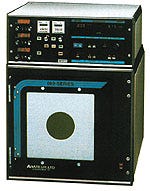
Cold gas plasma technology
Cold gas plasma surface treatment, which is conducted in a vacuum, allows designers to chemically change the surface of a plastic to suit a particular need. Applications include surface cleaning or promoting adhesion. The 600-series plasma system features an ultraclean quartz chamber with no metal parts inside, preventing parts from being exposed to the particulates associated with metal chambers. Furthermore, inductive coupling ensures multidirectional cleaning or surface modification. Anatech Ltd., 6621F Electronic Dr., Springfield, VA 22151-4303.
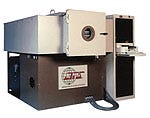
Surface modification system
A surface modification system can be used for a variety of surface treatments. Its chamber size is designed to meet customer specifications, and, in order to ensure uniform surface exposure, the system offers a patented gas-reversal feature. The system performs ultracleaning of medical devices such as angioplasty balloons, catheters, filter materials, syringe hubs, and intraocular lenses. Gas plasma technology is also used to increase bond strength, lubricity, wettability, and other characteristics. Operating costs are low and productivity is high since minimal power is required for plasma processing. For monitoring of temperatures and process values, specialized software ensures process uniformity. Advanced Plasma Systems Inc., 12000 28th St. N., St. Petersburg, FL 33716.
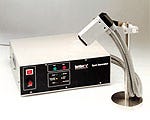
Custom electrical-discharge equipment
Custom equipment is available for the surface modification of polymers such as polypropylene, polyethylene, polyester, polystyrene, Teflon, polyurethane, and silicone. The surface modification process uses electrical discharges or coronas to increase the bonding sites of the polymer surface for increased adhesion of inks, paints, coatings, and adhesives. The process is conducted at atmospheric pressure and is easily integrated into production lines. Specialty shaped electrodes can treat many different 3-D surfaces. Also included is a high-powered multifunctional generator. Tantec Inc., 630 Estes Ave., Schaumburg, IL 60193.
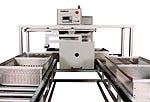
Automated gas plasma system
A microwave gas plasma system is designed for high-volume surface modification and ultrapure cleaning. Typical applications of the Model V170-G include polymer surface modification for increased wettability or hydrophobicity, plasma thin-film coatings (barrier, lubricious, or primer), and ultrapure cleaning of metals and ceramics. The unit features microwave/dual frequency for high throughput rates, a large electrode-free chamber, and microprocessor control with stored-recipe capability. A fully integrated automated handling system can be customized to minimize operator involvement and accommodate specific production environments. Plasmatech Inc., 1895 Airport Exchange Blvd., Ste. 190, Erlanger, KY 41018.
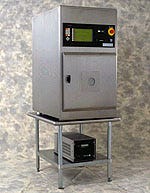
Surface modification for improving biocompatibility
Although products composed of materials such as plastics, polymers, and resins are designed to meet specific requirements, interactions within the body or in the laboratory can limit their performance. In cases where such materials fail to provide the desired level of biocompatibility, plasma surface modification can enable engineers to control or enhance thrombogenic biocompatibility, protein attachment, platelet retention, barrier layers, and cell attachment. A manufacturer offers the 7100-model plasma system for such applications. Metroline Industries, 251 Corporate Terr., Corona, CA 91719.
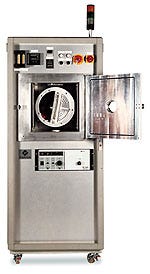
Plasma system with tumbler basket
A plasma system with an integrated tumbler basket has been added to a manufacturer's line of surface modification equipment. The tumbler feature is suitable for the plasma treatment of large volumes of small parts. Two models are available, one with a 1-cu-ft basket and the other with a 5-cu-ft one. The feature provides users with alternatives for plasma treatment. 4th State Inc., 1260 Elmer St., Belmont, CA 94002.
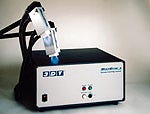
Corona treating systems
Corona treatment increases the wettability of polymer surfaces, allowing adhesion for printing, coating, and bonding applications. In addition, the MultiDyne 2 corona treating system can process petri dishes, test panels, and other disposable laboratory products for enhanced surface characteristics. The device's generator is connected to a single-phase power line (200–250 V, 50–60 Hz) and it can be used as a stand-alone unit or be interfaced to a manufacturing line. Softal 3DT LLC, N114 W18850 Clinton Dr., Germantown, WI 53022.
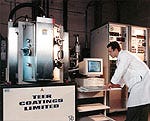
Unbalanced magnetron sputtering
A coating system incoporating unbalanced magnetrons in a patented "closed field" arrangement offers flexibility, reliability, control, and ease of use. Process parameter details for virtually any coating can be included in the technology transfer package that accompanies all systems. According to the manufacturer, coatings are deposited with the highest level of ion current yet available—but at low-bias voltage to ensure dense structures with low internal stresses and good adhesion. Deposition is possible at low temperatures while retaining these properties. Total control of reactive processes is provided by an optical emission system. Multi-Arc Inc., 200 Roundhill Rd., Rockaway, NJ 07866
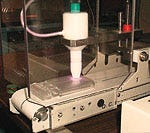
Plasma treatment system
The PT-2000 plasma treatment system increases the adhesion characteristics of almost any nonconductive material, including plastics, silicone, rubber, resins, and fluoropolymers. The PT-2000 is suited for applications that require improvements in the gluing, potting, marking, painting, or coating of a nonconductive material. Typical applications include the treatment of connector shells, connector inserts, and PC boards. Tri-Star Technologies, 2201 Rosecrans Ave., El Segundo, CA 90245.
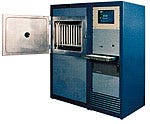
Plasma systems
Custom vacuum chambers and electrode configurations for any part size are available for a company's plasma systems. High- and low-frequency RF generators, computer and manual control systems, and process temperature controls are all incorporated. Also available are multiple gas flows, up to three gas-flow controllers, and an automated vacuum-chamber door. Applications include sterilizing, increasing adhesion, promoting bonding, and depositing nonstick, slippery coatings. Plasma Etch, 3522 Arrowhead Dr., Carson City, NV 89706.
You May Also Like


